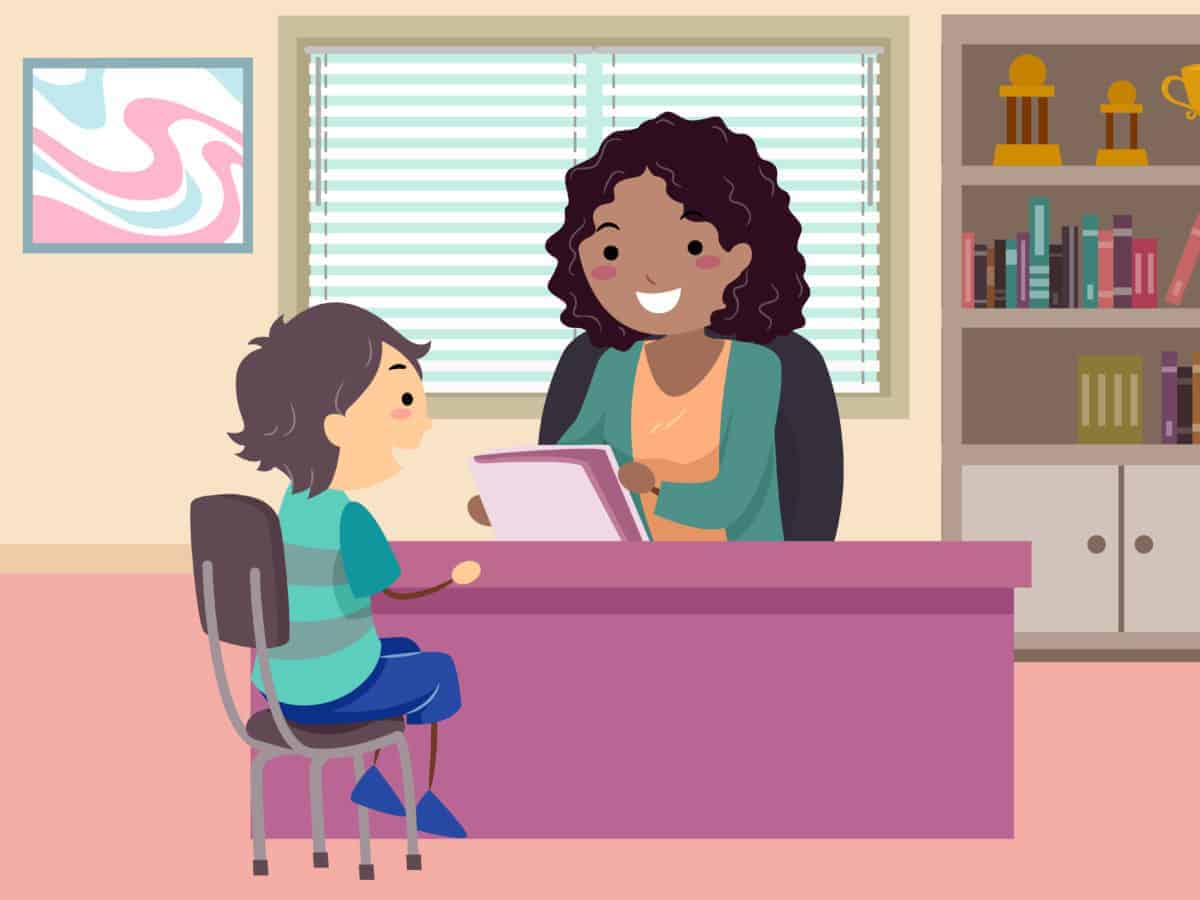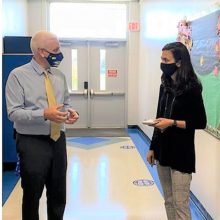

Recently, Education Week ran a survey about the principal-teacher relationship, and the Pew Research Center ran a survey about the trust Americans have in our leaders, finding school leaders are more trusted than other positions of influence.
EdNC wanted to see if those national findings held up in North Carolina, so we asked K-12 principals and teachers to share their thoughts on a variety of questions related to the role of principals in schools.
The following data and results are from two Reach NC Voices surveys. The surveys ran from Nov. 5 to Nov. 14, 2019. During that time, 778 K-12 teachers responded to the teacher survey, and 99 K-12 principals responded to the principal survey. There are roughly 2,681 K-12 principals and 100,336 K-12 teachers in North Carolina.
Due to drop off throughout the survey, sample size fluctuated by question. Both surveys were offered on EdNC.org and sent via email to teachers and principals across the state.
These results offer a brief, informal snapshot on issues related to principals and include only unverified, self-reported data.
Principal pay
These questions were only included in the principal survey and were designed to gather opinions on the current state of principal pay in North Carolina.
The principal pay structure in North Carolina is based on a model that takes into account a school’s average daily membership and academic growth. A principal is given a base salary based on the size of his or her school, and then has the opportunity to earn more if his or her school meets growth or exceeds growth.
Principals can also get a bonus depending on how well their school did compared to statewide growth.
If a school is in the top 5% for statewide growth, the principal can get an additional $15,000. If it is in the top 10%, an additional $10,000; top 15%, $5,000; top 20%, $2,500; and top 50%, $1,000.
In general, respondents expressed dissatisfaction with the principal pay plan as it stands.
Of the 99 K-12 principals who responded, only 9% agreed that they are satisfied with the structure of the North Carolina compensation plan for principals. An overwhelming majority of respondents agreed that years of experience should be reintroduced to the pay plan. Only 15% of respondents agreed that the balance between base pay and performance pay is appropriate, and only 16% agreed that the bonus structure of the pay plan is fair and incentivizing.
“The role of principal has changed over the years and the compensation needs to match what the expectations are.” — Principal in Johnston County
“My school is small but I do not have an assistant principal. I work hard or harder than principals of larger schools that may have an assistant principal or two. The state should take into consideration the number of kids per administrator rather than the number of kids per principal. Some principals are paid more and have a pupil ratio per administrator much smaller than I do.” — Principal in Haywood County
The recently-released Leandro report from WestEd included a brief discussion of results from a survey of North Carolina principals that was conducted as part of the study.
In that survey:
- ~24% of respondents indicated compensation as the major factor that would cause them to leave their principal roles in the next three years.
- ~24% of respondents reported that as a result of the new principal compensation policy (which eliminates consideration of a principal’s experience in favor of pay based on school performance), they would “seek to retire as soon as possible,” “leave to obtain principalship in another school,” or “leave the principalship.”
- ~44% of respondents said they “oppose” or “strongly oppose” North Carolina’s principal compensation policy.
Teacher-principal relationships
These questions were asked of both principals and teachers, separately. Differences in responses highlight areas in which teachers and principals may view their relationship differently.
While 100% of principal respondents said they agree or strongly agree that they support teachers who start innovative work or new initiatives, teacher respondents were more divided — only 64% said the same.
Similarly, 91% of principal respondents agreed or strongly agreed that teachers in their school feel empowered to bring problems to them. Among teacher respondents, 57% said the same.
In the next question, respondents were asked: When it comes to the teacher-principal relationship at your school, which of the following is a major source of friction? Then, respondents were prompted to select all that apply from a list that included: principal feedback on teaching, student discipline, professional development requirements/opportunities, planning period timing/scheduling, assignment of classes/subjects, duty assignments (e.g. lunch duty, hall duty), parents, instructional approaches/philosophies, and none of the above.
Among principal respondents, the three most-selected answers were: none of the above, instructional approaches/philosophies, and professional development requirements/opportunities. However, among teacher respondents, the three most-selected answers were: student discipline, planning period timing/scheduling, and duty assignments (e.g. lunch duty, hall duty).
“Always know your why. Why do you do what you do? A principal should engage, encourage, and empower students and teachers. Approachability and visibility are keys to cultivating relationships both in the school and the greater community. Embrace change and always keep students at the forefront of what you do and why you do it.” — Principal in Stokes County
“Principals that support their teachers and cultivate a supportive environment tend to get better results.” — Teacher in Cumberland County
Role of principals
In the next section, both teachers and principals were asked how often principals should give each teacher formal or informal feedback on instruction, and then they were asked how often they actually receive (teachers) or give (principals) that feedback. Teachers answered similarly to both questions — 54% of teacher respondents said principals should give feedback a few times a year, and 64% of teacher respondents said their principals do give feedback a few times a year.
Among principal respondents, 55% said principals should give feedback weekly, and 41% said they actually give feedback monthly (with 37% saying they give it weekly).
Then, both teachers and principals were asked to rank the order that principals should prioritize their accountability to students, parents, teachers, and the district. Then, they were asked to rank the order that principals actually prioritize their accountability to those groups.
In the first, hypothetical question — how principals should prioritize their accountability — teacher and principal respondents were in agreement. They both ranked items in this order: 1) students, 2) teachers, 3) parents, 4) the district.
Interestingly, principals didn’t waver in their response — ranking items the exact same way when asked how they actually prioritize their accountability. But, when teachers were asked how their principals actually prioritize their accountability, teacher respondents ranked the items in this order: 1) district, 2) students, 3) parents, 4) teachers.
“A principal can make or break a school. I have been very fortunate to work with some great principals. My favorite ones are the ones that make policies based on what is best for students. When a school puts students’ needs first (both academic and social emotional) you cannot help but create an environment that is positive and welcoming.” — Teacher in Mitchell County
“I have an excellent principal, and he is always willing to listen to my concerns. However, I have established a relationship with him where he knows if I bring up a concern, it’s legitimate. My principal is very focused on parents’ and the district’s perception of our school, and at times that can be frustrating.” — Teacher in Nash County
Trust in principals
These questions were only asked of teacher respondents and were modeled after questions in a recent Pew Research Center survey.
More than half of teacher respondents said that principals care about the students in their schools all or most of the time. Roughly half of teacher respondents said both that principals handle resources available to them in a responsible way and provide fair and accurate information to the public all or most of the time.
Teacher respondents were more divided on how often principals act unethically, with 38% saying none of the time and 22% saying some of the time.
Stay tuned to EdNC.org the rest of the week as we continue our coverage of principals.


